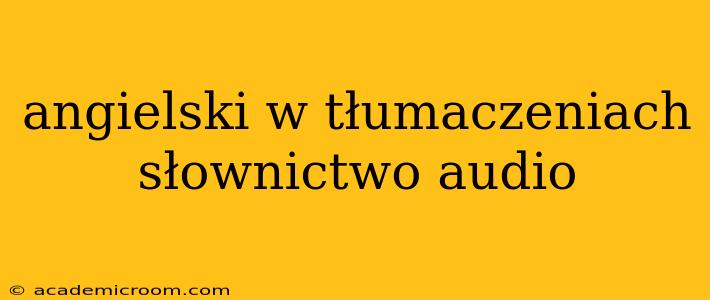English in Translations: Vocabulary and Audio Resources for Enhanced Learning
Mastering English, particularly its nuanced vocabulary, is a journey requiring dedication and the right resources. This post delves into effective strategies for expanding your English vocabulary through translations and leveraging the power of audio resources. We'll explore how to effectively use translations to learn new words and phrases, and how audio can significantly boost comprehension and pronunciation.
How Can I Improve My English Vocabulary Through Translation?
Improving your English vocabulary using translations involves a multi-faceted approach. It's not simply about looking up single words. Instead, focus on understanding the context in which words are used. This contextual understanding is crucial for truly grasping the meaning and appropriate usage.
Here's a breakdown of effective techniques:
-
Parallel Texts: Reading parallel texts – that is, the same text in both your native language and English – is invaluable. This allows you to directly compare vocabulary and grammatical structures, highlighting differences and similarities. Pay close attention to how words are used differently in different contexts.
-
Active Recall: Don't just passively read translations. Actively test yourself. After reading a section in your native language and its English counterpart, try to recall the English equivalents without looking back. This reinforces memory and solidifies your understanding.
-
Focus on Collocations: Pay attention to how words are typically used together (collocations). For example, instead of simply learning "make a mistake," note the nuances of phrases like "commit a blunder," "make an error," or "make a slip-up." These seemingly minor variations reflect different levels of severity and formality.
-
Use a Bilingual Dictionary: While online translators are convenient, a good bilingual dictionary offers deeper insight into word meanings, including nuances and examples of usage. Look for dictionaries that provide detailed explanations and illustrative sentences.
-
Translation Apps with Examples: Many translation apps provide not only direct translations but also example sentences showcasing the word in context. Leveraging these examples expands your understanding beyond a single definition.
What are the Best Audio Resources for Learning English Vocabulary?
Audio resources are invaluable for improving pronunciation, listening comprehension, and expanding vocabulary organically. Immersion is key. Here are some effective approaches:
-
Podcasts: Podcasts cater to various interests and skill levels. Choose podcasts focused on topics you enjoy; this keeps the learning process engaging and motivating. Start with podcasts designed for intermediate learners and gradually move to more advanced ones.
-
Audiobooks: Listening to audiobooks allows you to passively absorb vocabulary within a captivating narrative. Choose audiobooks with accompanying texts to follow along and aid comprehension. Pay close attention to how words are pronounced and used in context.
-
Language Learning Apps: Many language learning apps incorporate audio components, such as pronunciation guides and interactive exercises. These apps offer structured learning paths, making vocabulary acquisition more systematic.
-
YouTube Channels: YouTube offers a treasure trove of English learning videos, from vocabulary lessons to pronunciation tutorials. Find channels that suit your learning style and preferences.
-
Music: Listening to English music exposes you to natural speech patterns and a wide range of vocabulary. Start by reading the lyrics as you listen, then try to understand the song without the lyrics.
What are Some Useful Websites or Apps for English Vocabulary Building?
Many websites and apps focus on vocabulary building. Some popular choices include Memrise, Duolingo, Quizlet, and vocabulary.com. These platforms offer interactive exercises, flashcards, and personalized learning plans. Explore different options to find the one that best suits your learning style. Remember that consistency is key to success.
How Can I Use Audio to Improve My Pronunciation and Fluency?
Improving pronunciation and fluency through audio requires active listening and repetition.
-
Shadowing: Listen to a short audio clip and try to mimic the speaker's pronunciation and intonation as closely as possible. This technique enhances your pronunciation and improves your fluency.
-
Dictation: Listen to a short audio segment and write down what you hear. This exercise improves your listening comprehension and spelling skills.
-
Record Yourself: Record yourself speaking English and compare your pronunciation to that of a native speaker. This will highlight areas needing improvement.
By combining translation techniques with immersive audio resources, you can build a robust English vocabulary and improve your overall language proficiency. Remember that consistent effort and engagement are essential for success in language learning.
